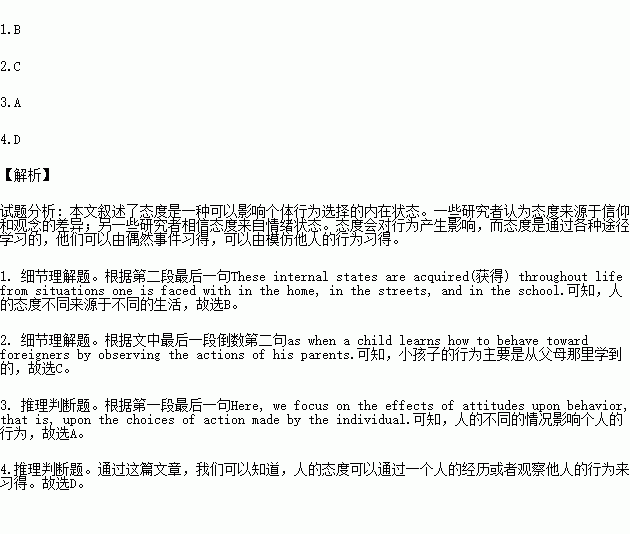题目内容
Attitude is an internal(内在的) state that influences the choices of personal action made by the individual. Some researchers consider that attitudes come from differences between beliefs and ideas; others believe that attitudes come from emotional states. Here, we focus on the effects of attitudes upon behavior, that is, upon the choices of action made by the individual.
The kinds of actions taken by human beings are obviously influenced greatly by attitudes. Whether one listens to classical music or rock, whether one obeys the speed limit while driving, whether one encourages one’s husband or wife to express his or her own ideas—all are influenced by attitudes. These internal states are acquired throughout life from situations one is faced with in the home, in the streets, and in the school.
Of course, the course of action chosen by an individual in any situation will be largely determined by the particulars of that situation. An individual who has a strong attitude of obeying laws may drive too fast when he is in a hurry and no police cars in sight. A child who has a strong attitude of honesty may steal a penny when she thinks no one will notice. But the internal state which remains unchanged over a period of time, and which makes the individual behave regularly in a variety of situations, is what is meant by an attitude.
Attitudes are learned in a variety of ways. They can result from single incidents, as when an attitude toward snakes is acquired by an experience in childhood at the sudden movement of a snake. They can result from the individual’s experiences of success and pleasure, as when someone acquires a positive attitude toward doing crossword puzzles by being able to complete some of them. And frequently, they are learned by copying other people’s behavior, as when a child learns how to behave toward foreigners by observing the actions of his parents. Regardless of these differences, there is something in common in the learning and modification(修正) of attitudes.
1.According to the passage, we know attitudes _________.
A. are largely affected by one’s behavior
B. come from different situations in one’s life
C. remain unchanged in one’s daily life
D. could be chosen according to one’s will
2.Which of the following is TRUE about the learning of attitudes?
A. Attitudes are only learned through one’s success.
B. Copying others’ behavior is not a good idea.
C. Attitudes can be learned from one’s parents.
D. Attitudes learned in danger will last longer.
3.The author uses the examples in Paragraph 3 to show ________.
A. particulars of a situation may influence an individual’s action
B. people with good attitudes may sometimes do bad deeds
C. an individual may change his or her attitude fairly easily
D. people often make mistakes when they are not noticed
4.Which of the following can be learned from the passage?
A. Researchers believe that attitudes only come from emotional states.
B. Attitudes have a bad influence on actions.
C. An honest child won’t steal a penny.
D. Attitudes can be learned either by one’s experience or by observing the actions of others.

